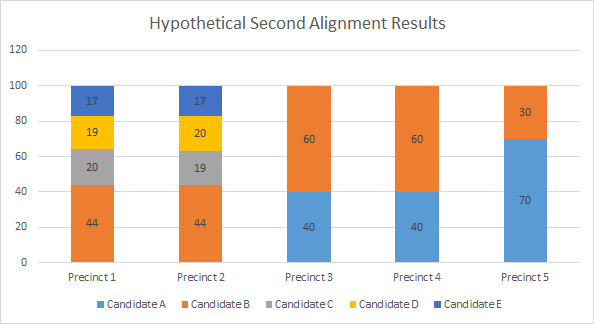A slightly expanded version of this was moved here: What’s the Matter with Iowa.
You might think that first-past-the-post or the plurality vote is the worst voting system ever. You’d be wrong. In 2017, my student, Brandon Payne studied the Iowa Caucuses. He determined that the caucuses violate all sorts of mathematical “fairness criteria.” One example is the Condorcet criterion which states that if one candidate beats every other candidate in head-to-head match-ups, that candidate should be the overall winner. Such a candidate might not win the Iowa Caucuses.
Turns out, the viability constraint can also lead to seemingly contradictory results, which I’ll call the “viability paradox.” As a quick example, suppose that in some state, the voters have the following preferences.
| Candidate A | 35% |
| Candidate B | 30% |
| Candidate C | 12% |
| Candidate D | 12% |
| Candidate E | 11% |
In a primary election, this would be a clear victory for candidate A.
Now let’s divide our state into five precincts of 100 voters each and let’s assign each precinct 10 delegates. We’ll conduct a caucus to allocate the delegates.
Suppose that the voters are arranged within the caucuses according to the graphic below.

Notice that there are non-viable candidate preference groups in each precinct. These voters will have to join a viable group in order to participate. They may reorganize themselves as shown below.

And so, in this case, Candidate B actually wins pretty decisively, probably 23 delegates to 15 delegates for A. Candidates C, D and E should get 4 delegates each.
There might be good reasons to decide that either candidate A or B is the rightful winner here, but one point is that there is a significant difference. Systems like this can lead to chaotic or paradoxical results. One important take away is that, right or wrong, geography can have a lot of influence on who the victor will be. Even if a candidate seems to be ahead in the polls, they can lose without any shenanigans going on, simply because how their voters are distributed across the state. Surprising results aren’t necessarily nefarious or even necessarily surprising.
You might even want to argue that results like this are a good thing because a lot of voters got to express their second choices. Here’s why you’d be wrong. It’s not systematic. In Instant Run-Off voting, for example, everybody’s second choice is counted unless their first choice is. In the caucus exactly whose second choices are counted is determined by an accident of geography. In deciding a winner between candidates A and B above, should the second choices of voters who picked candidate C in precinct 1 be less important than those in precinct 3? They shouldn’t be but in the current system they are. This is worse than a plurality vote because this could be taking us even farther away from a good collective decision.

